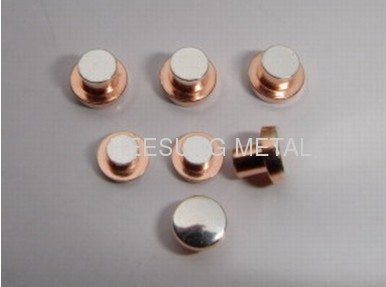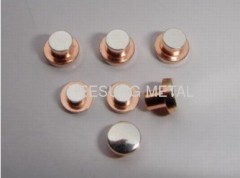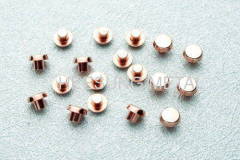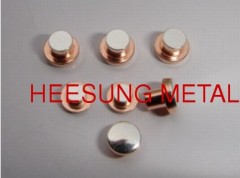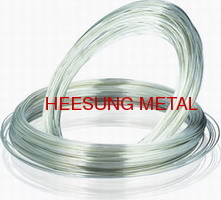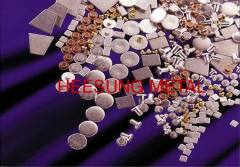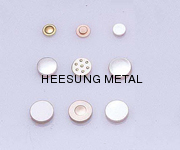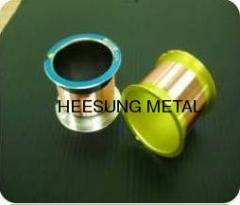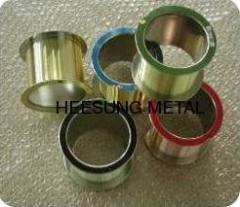
|
Heesung Metal Co.,Ltd
|
Bi-Metal Contact Rivet;Tri-Metal Contact Rivet with good quality and low price
| Payment Terms: | T/T,L/C |
| Place of Origin: | Guangdong, China (Mainland) |
|
|
|
| Add to My Favorites | |
| HiSupplier Escrow |
Product Detail
Contact is an electrical contacting element to open and close the circuit mechanically.
Trademark: | HEESUNG METAL |
Packing: | Vacuum Pack |
Standard: | ISO, SGS |
Origin: | Shenzhen China |
HS Code: | 85369000 |
Production Capacity: | 100000000PCS/Month |
Product Description
1. Pure silverhas a high level of electrical and thermal conductivity, good plasticity and arc corrosion resistance, as well as a very low contact resistance.
1). It iseasily soldered and is the ideal contactor material for continuous, enclosed electric connectors.
2). It is one of the most widely used materials in small capacity and low voltage electrical appliances, such as automatic control switches, thermostats, baking machines, oven, timers, thermal relays, and computers.
2. AgCu rivet:
This contact has good electrical conductivity and its surface is not liable to oxidization. The addition of 3 - 28% copper may remarkably improve the silver's flame resistance. Hence, copper contact material may be used in current strength up to 16A. The addition of copper, especially of high copper content, for example 10%, will greatly reduce material transferring during DC working conditions. It is widely used in AC contactors, relays, electric tool switches, buttons, timers, and other household electrical appliances.
3. Fk AG contact rivet:
This fine crystal silver contains a 0.12% nickel additive and has a low contact resistance, which is similar to that of pure silver, without the variable switching times. Its fusion welding and flame resistance is slightly higher than that of pure silver, and under almost equal contact resistance, its strength and heat resistance are higher than that of a silver-copper composite contactor. It is suitable for various temperature adjustments of working current <10A.
4. AgNi /Cu bimetal rivet:
In low voltage engineering, this contact is widely used in AC switches as an electrical contact. Its advantages include that it may be directly soldered to contact bridges, without the need for additional solder layers, thus making manufacturing of contactor components simple and economical.
5. AgCdO/Cu bimetal rivet
1)This contact includes AgCdO10, AgCdO12, AgCdO15, and this kind of electrical contact has one of the most important materials in silver - metal oxide contact material. The fine CdO gives the contact special properties. When the temperature is above900oC, CdO sublimes, which cools the contactor surface and reduces arc energy and extinguishments. In addition, existence of cadmium oxide will improve
2)the welding resistance of the contactor. Its typical applications include low voltage contactors, relays, automatic switch flash relays, auxiliary switch series, timers, starters, breakers and leakage protective switches.
6. AgZnO Rivet and AgZnO/Cu bimetal rivet and tri-metal rivet
The oxide of this contactor is more thermally stable than CdO. Because of the higher stability of ZnO and AgZnO, the contactor material increases the contactor resistance, which would be compensated through structural means, such as a higher contacting force.
7. AgSnO2 and AgSnO2 In2O3 and bimetal rivet tri-metal rivet
1)AgSnO2 and AgSnO2In2O3 are the ideal environment-protecting materials for substituting AgCdO. Since SnO2 has better thermal stability and higher hardness than CdO, AgSnO2 and AgSnO2 In2O3 is higher and it is more difficult to processing these two materials.
2)This kinds of electrical contact will be widely used in 2005, and our product have passed the certificate of SGS.
1). It iseasily soldered and is the ideal contactor material for continuous, enclosed electric connectors.
2). It is one of the most widely used materials in small capacity and low voltage electrical appliances, such as automatic control switches, thermostats, baking machines, oven, timers, thermal relays, and computers.
2. AgCu rivet:
This contact has good electrical conductivity and its surface is not liable to oxidization. The addition of 3 - 28% copper may remarkably improve the silver's flame resistance. Hence, copper contact material may be used in current strength up to 16A. The addition of copper, especially of high copper content, for example 10%, will greatly reduce material transferring during DC working conditions. It is widely used in AC contactors, relays, electric tool switches, buttons, timers, and other household electrical appliances.
3. Fk AG contact rivet:
This fine crystal silver contains a 0.12% nickel additive and has a low contact resistance, which is similar to that of pure silver, without the variable switching times. Its fusion welding and flame resistance is slightly higher than that of pure silver, and under almost equal contact resistance, its strength and heat resistance are higher than that of a silver-copper composite contactor. It is suitable for various temperature adjustments of working current <10A.
4. AgNi /Cu bimetal rivet:
In low voltage engineering, this contact is widely used in AC switches as an electrical contact. Its advantages include that it may be directly soldered to contact bridges, without the need for additional solder layers, thus making manufacturing of contactor components simple and economical.
5. AgCdO/Cu bimetal rivet
1)This contact includes AgCdO10, AgCdO12, AgCdO15, and this kind of electrical contact has one of the most important materials in silver - metal oxide contact material. The fine CdO gives the contact special properties. When the temperature is above900oC, CdO sublimes, which cools the contactor surface and reduces arc energy and extinguishments. In addition, existence of cadmium oxide will improve
2)the welding resistance of the contactor. Its typical applications include low voltage contactors, relays, automatic switch flash relays, auxiliary switch series, timers, starters, breakers and leakage protective switches.
6. AgZnO Rivet and AgZnO/Cu bimetal rivet and tri-metal rivet
The oxide of this contactor is more thermally stable than CdO. Because of the higher stability of ZnO and AgZnO, the contactor material increases the contactor resistance, which would be compensated through structural means, such as a higher contacting force.
7. AgSnO2 and AgSnO2 In2O3 and bimetal rivet tri-metal rivet
1)AgSnO2 and AgSnO2In2O3 are the ideal environment-protecting materials for substituting AgCdO. Since SnO2 has better thermal stability and higher hardness than CdO, AgSnO2 and AgSnO2 In2O3 is higher and it is more difficult to processing these two materials.
2)This kinds of electrical contact will be widely used in 2005, and our product have passed the certificate of SGS.

